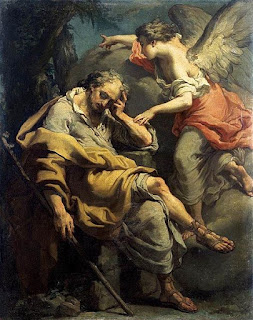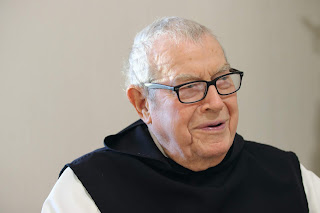Mary’s question, Son,
why have you done this to us?, implies that she does not think that Jesus
had a right to do what he did. But Jesus’ reply to his mother
surpasses her complaint in its trenchancy: Why were you looking for me? Did you not know
that I must be about my Father’s business?
He seems surprised that they were looking for him at all, as if they
should have known better. But he’s
speaking to them from another level of existence. To his Did
you not know?, Mary could well have retorted: ‘No, indeed!
We did not know! How could
we have known? You are, after all, only
twelve years old!’ But Mary is too
deeply wise and pure in her love to speak thus.
She abides in a silence full of awe and obedience.
Here is the point of extreme difficulty, when God chooses
to reveal his nature as Redeemer through the agency of ordinary human
beings. These ordinary human beings are
expected by God—whether they are ready or not—to rise to their divine vocation
with a sudden violence to the heart, and to become pliant instruments for God’s
self-manifestation to the world. Nothing
could have prepared Mary and Joseph specifically for this occasion, for this experience
of the loss of their precious Son! Yes, they had received angelic revelations
and promises about Jesus’ messianic vocation; but every time what shocks human
expectations and demands painful sacrifices is the specific and surprising manner in which God’s designs take form in our flesh. ‘Why like this, O God?’, Mary could well have
asked.
The text becomes most demanding, however, when the
evangelist uses the word ‘father’ twice in mutually contradictory senses that
must have made Joseph wince. When Mary
says: Your father and I have been looking for you with great anxiety, Jesus
replies: Did you not know that I must be about my Father’s business? Here
Jesus seems to be rejecting the fatherhood of the very Joseph whom Jesus’
heavenly Father’s angel had persuaded to accept it!
But they did not understand
what he said to them: Joseph and Mary have to abide
in the darkness of unknowing while continuing to care for Jesus with all their
tender love, grooming him, we might say, for the day when he would leave them
behind definitively. Thus, the mission of every parent to help their children
grow in freedom, wisdom and grace becomes, in the case of Jesus’ parents, the
mission to prepare Jesus to offer himself for the salvation of others through a
life of sacrifice.
Duccio di Buoninsegna, The Finding of Jesus in the Temple. Excerpts from a Homily for the Feast of the Holy Family by Father Simeon.

















